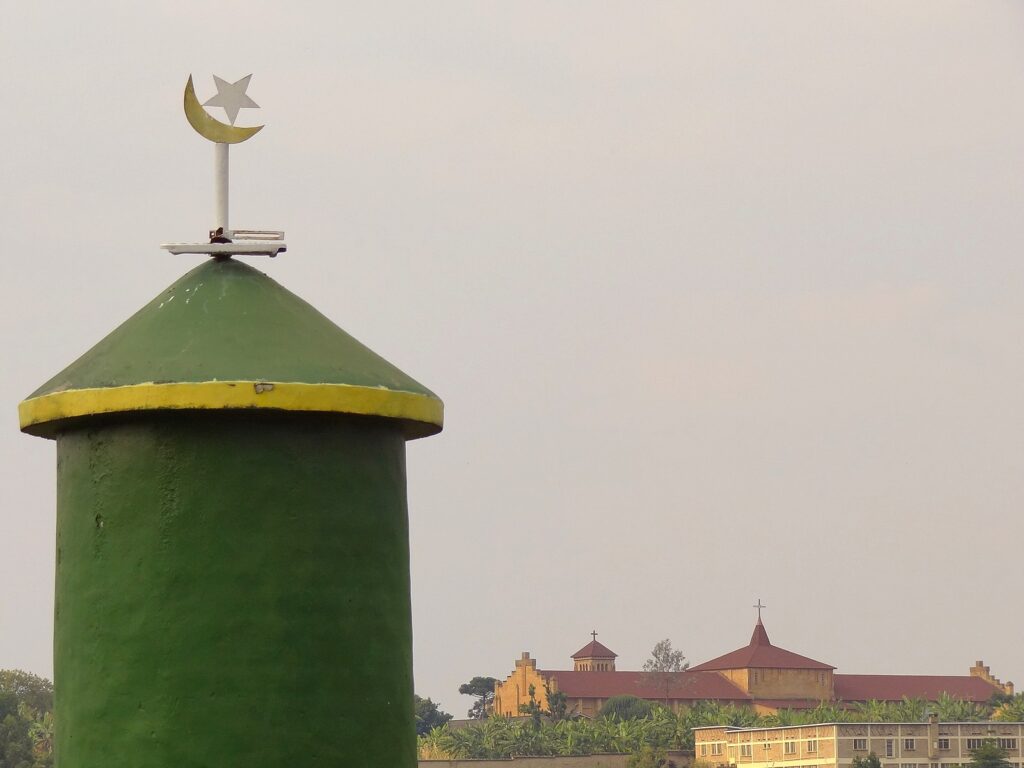Trigger warning: references to genocide and ethnic violence
As ethnic and political violence erupted in Rwanda in April of 1994, thousands of members of the Tutsi minority ethnic group fled to Catholic and Protestant churches in search of sanctuary. In many instances, they were met by violence. Military forces and civilian armed groups surrounded the churches and systematically killed those sheltering inside, throwing hand-grenades through windows and targeting survivors with machetes and spears. Perhaps most shocking was the degree of involvement by Hutu clergymen, with one priest, Father Athanase Seromba, encouraging bulldozers to destroy his parish which contained nearly 2,000 Tutsis. It was only during a 2017 state visit to Rwanda that Pope Francis formally broke from the Vatican’s traditional stance of recognising the individual responsibility of clergymen for facilitating the genocide, while maintaining an absence of institutional responsibility on the part of the Catholic Church. In a declaration made following a meeting with Rwandan President Paul Kagame, Pope Francis asserted that the ‘sins and failings of the church and its members’ over the course of the three-month genocide had, forever, ‘disfigured the face’ of Catholicism.
In contrast, however, no Tutsi seeking shelter in Rwanda’s mosques was killed with the collusion of Muslim leaders. At the Hutu-majority village of Mabare, for instance, young men from the local mosque, under the direction of Imam Rashid Bagabo, resorted to using sticks and stones to defend Tutsi Muslims and Christians hiding inside. Such scenes were repeated elsewhere in Rwanda, with Muslims in Kigali resisting attempts by local militias to remove Tutsis by declaring:
“There is no Hutu, no Tutsi, we are all simply human beings”.
Anonymous Rwandan Muslim, Resistance and Protection: Muslim Community Actions During the Rwandan Genocide
Although factors such as political marginalisation, at the hands of the ruling Hutu-dominated National Revolutionary Movement for Development party, and the personalities of individual religious leaders contributed to this, the behaviour of Rwanda’s Muslim community raises a pertinent question: to what extent were the actions of Rwandan Muslims towards individuals belonging to entirely different religious or ethnic communities exceptional?
The Biology of Peace
Much of my research into the intersection between psychology and peacebuilding has examined instances of altruism and cooperation between non-kin groups and individuals. Instances of altruism have traditionally been regarded as aberrations in natural and social sciences, dominated by the Darwinian belief that natural selection favoured the evolution of physical and behavioural traits which enhanced the survivability of individuals and their family. In effect, egoistic behaviour is rooted in human nature, and the tendency to place the needs of oneself and one’s immediate group above those of the wider collective is simply reflective of the evolutionary instinct which ‘contributes to fitness’. This belief in natural human egoism has a tangible impact, informing generations of research and policymaking in the field of peacebuilding and conflict resolution.

The dominant Realist framework of International Relations, for instance, reflects this Darwinian understanding of human nature. In the words of Hans Morgenthau, the father of Classical Realism, ‘whatever man does or intends to do emanates from himself and refers again to himself’. When combined with Charles Darwin’s work in the field of natural sciences, theoretical approaches such as Realism possess a powerful rhetorical justification for their foundational belief: the notion of aggression and egoism as unalterable facets of human behaviour that are reflected on a larger scale between subnational groups and larger nation-states. A belief in the potential for cooperation and altruism across constituencies is, thus, deeply misguided, with selfish or war-like behaviour deemed the immutable result of the biological ‘selection pressure’ to develop them.
The Darwinian model has been leveraged as a powerful discursive tool to legitimise the notion of peaceful behaviour across group boundaries as a clear deviation from the ‘natural’ instincts central to survival. Such conceptualisations, however, frequently disregard the extent to which human interaction is driven by factors beyond evolutionary impulses. Human survival, for instance, has always been critically dependent upon processes of ‘social interaction’ and cooperation between increasingly complex ‘hominid social groups’. Over time, this degree of social interdependence was reinforced and formalised through the development of identities and norms. These identities are neither fixed nor singular in nature, and individuals are capable of ‘activating’ varying identities, with their associated normative exigencies, at different times.
In the case of Rwanda’s Muslims, the activated identity at the time of the genocide was religious in nature. In contrast to the country’s Christian population, for whom ethnic identities retained their constitutive force, Rwandan Muslims regarded themselves as a cohesive body whose social practices, ranging from intermarriage across ethnicities to the sharing of food and wealth, transcended the ethnic categories of Hutu and Tutsi central to the genocide. The decision of Rwandan Muslims to defend those who sought shelter in their community was a direct reflection of this activated group identity; however, it did not emerge in vacuum. Rather, this identity is rooted in themes of cooperation and altruism that form an integral part of pro-social behaviour central to survival and are, perhaps, far more intrinsic to human nature than we may traditionally imagine.
What do you think?
- In your view, is peace a facet of ‘natural’ human behaviour?
- Is peace possible without the presence of altruism?
- What ‘activated group identities’ would you pick out in your community that might incline people more towards peace than violence?
- Can you think of other displays of intergroup altruism and compassion amidst polarisation or conflict?
- Do you think that more attention to – and even nurturing of – particular ‘activated group identities’ can be a useful approach in conflict-prevention and peace-building? What are the risks as well as the advantages?
If you enjoyed this item in our museum…
You might also enjoy ‘Morning Light‘, ‘Peace on the Airwaves‘, ‘Intergroup Contact Theory‘, and ‘Achilles in Vietnam‘.
Mathias Katsuya, April 2023